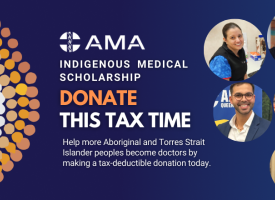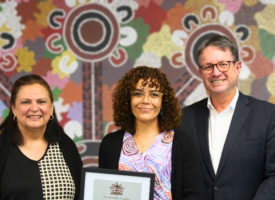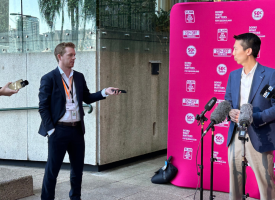Indigenous Males - improving their health for longer lives and a better quality of life
AMA Indigenous Health Report Card 2009
The eighth AMA Indigenous Health Report Card – The Health of Indigenous Males: Building Capacity, Securing the Future – was launched in Darwin today by the Minister for Indigenous Health, Warren Snowdon, and AMA President, Dr Andrew Pesce.
Dr Pesce said the Report Card this year highlights the tragic state of health for Indigenous males in Australia today, and proposes solutions that will ensure longer and better quality lives.
“Indigenous males are much more likely to die earlier from preventable causes than non-Indigenous males and Indigenous females,” Dr Pesce said.
“At every age – from boyhood to manhood – Indigenous males experience higher rates of diseases and conditions that are totally preventable.
“We need to take action to change this.
“There is evidence that the loss of status, self-esteem and sense of purpose experienced by many Indigenous men is intimately bound up with their poor health as both a cause and an effect.
“All Australian men need a sense of purpose in their lives, and they deserve to feel pride in themselves, their families and their culture.
“The absence of these things has had profound implications for the health of Indigenous men, who may have also lost their connection to their country, their language, and their spirit.
“A key element of the solution is for Indigenous men to recapture control of their lives and the factors that determine their health and life prospects.
“This cannot be achieved without genuine collaborative relationships between Indigenous Australians, governments and health agencies, and a national plan for closing the gap.
“The AMA believes it is important not to become overwhelmed or paralysed by the dire facts about the health of Indigenous males.
“Our efforts as a nation to close the gap on Indigenous life expectancy will not succeed unless we turn around the high rates of poor health and early death among Indigenous boys, adolescents and men.
“We must work together to provide the right support, the right partnerships, and the right opportunities for Indigenous people to empower themselves for better health,” Dr Pesce said.
The AMA Indigenous Health Report Card 2009 collates the tragic facts of the health of Indigenous males, including:
- An Indigenous boy born during 2005-2007 can expect to die at age 67, nearly six years earlier than an Indigenous girl, and 11.5 years earlier than a non-Indigenous boy born in the same period;
- Between 2005 and 2007, Indigenous boys were 1.4 times more likely to die in the first year of their lives than Indigenous girls, and nearly twice as likely to die as other infants in the general population;
- Between 2005 and 2007, Indigenous men died at higher rates than non-Indigenous men at all ages;
- Cardiovascular disease (including heart disease and stroke) was the leading cause of preventable death among Indigenous men, and accounted for 27 per cent of deaths between 2002 and 2005;
- Indigenous men had significantly higher levels of hospitalisation, at a standardised rate of 876 per 1,000 in 2007-08 compared with 358 per 1,000 for non-Indigenous males;
- In 2004-06, Indigenous males were more than twice as likely to be hospitalised for mental health and behavioural disorders than non-Indigenous males;
- In 2002, more than one-quarter of Indigenous males 15 years and over reported that they had been a victim of threatened or actual violence in the previous 12 months; and
- The WA Aboriginal child health survey reported that 12 per cent of Indigenous males aged 12-17 years had thought about ending their lives in the previous 12 months, and four per cent had attempted to do so in this period.
The Report Card details AMA proposals to improve the health of Indigenous males through primary health care services and workforce, quality care in all Australian health services, local community capacity building, health promotion and chronic disease prevention, strategies to keep Indigenous males out of prison, a focus on social and emotional wellbeing, and promotion of economic engagement and entrepreneurial opportunities.
The Report Card also showcases success stories such as the Danila Dilba Men’s Clinic in Darwin, the ‘I’m an Aboriginal Dad’ support program (Vic), The Clontarf Foundation (WA), Panyappi Indigenous Youth Mentoring Program (SA), The Uncle Nephew Program, and Social Inclusion SA – Aboriginal Boys and Young Men’s Program.
The AMA acknowledges the assistance and input of the National Aboriginal Community Controlled Health Organisations (NACCHO) and the Australian Indigenous Doctors’ Association (AIDA) in the research and production of this Report Card.
The Health of Indigenous Males: Building Capacity, Securing the Future is available on the AMA website at http://www.ama.com.au/node/5114
10 November 2009
CONTACT:
John Flannery 02 6270 5477 / 0419 494 761
Peter Jean 02 6270 5464 / 0427 209 753



